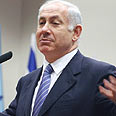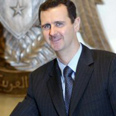

Syria is waging an indirect war against Israel, Likud leader Binyamin Netanyahu said on Wednesday
"Syria is connected to the axis of evil and Iran. Planes in Syria supply Hizbullah, as do Syrian-made weapons. They are waging war against us actively, and giving refuge to twelve terror groups," he told a Tel Aviv conference organised by the Institute for National Security Studies.
The opposition leader said that if Damascus were serious about peace with Israel, it would "first stop attacking us, throw out (Khaled) Mashaal, and disconnect from Iran."
"In any peace agreement with Syria, we must remain on the Golan," Netanyahu declared, adding that the "Syrians too would have to compromise if they want peace."
Asked why peace negotiations with Syria failed when he was prime minister in 1996, Netanyahu said: "I'm not willing to give back the Golan, and therefore the negotiations with Hafez Assad collapsed. He demanded I withdraw from the Golan, and I refused."
Most of Netanyahu's address dealt with the Iranian threat. He outlined a two-pronged approach to dealing with Tehran, "an internal effort, which at this stage there is no need to expand upon," and an "external moral, political, and economic campaign to isolate" the Iranian regime, which he described as "genocidal."
"For the first time in my life, I see a strange phenonemon. Most of the Arab regimes see that they need to change focus (onto Iran), while here it is not yet fully understood."
He described Hamas as an arm stretching out from the "octopus of Iran," and called for it "to be cut," leaving room for moderate forces to ascend to power in the Palestinian Authority.
"Hamas must be overthrown, this arm must be cut off in Gaza," Netanyahu said. "It's a simple scissor cut to allow moderates to come in," he added.
Netanyahu added that "without Iran, Nasrallah would last for two days, and Hamas for two hours perhaps."
"If we deal with Iran, we can deal with the Palestinians," he emphasized, attacking what he described as a "mistaken world-view," which placed the Israeli-Palestinian conflict at the heart of radical Islam's confrontation with the West. In fact, it was the other way around, Netanyahu argued.
"Every territory we cede unilaterally becomes a base of attack for the forces of extreme Islam against us," he said.
Answering a question on the recent find by the IDF of explosive devices on the border with Lebanon, Netanyahu told Ynetnews: "I need more information before I can respond."
Open nuclear deterrence best option
Earlier, the conference heard Dr. Reuven Padatzur, of the Netanya Academic College, say that the best option for Israel to deal with Iran, should it go nuclear, was for Jerusalem to openly declare its nuclear capabilities, and make clear that for "every Iranian nuclear missile flying towards Israel, there will be an Israeli missile flying in the opposite direction, and within 14 minutes, Iranian cities would be wiped out."
Padatzur said an Israeli military preemptive strike on Iran to end its nuclear program would "be a strategic mistake," casting doubts on intelligence estimates, and the ability of weapons to reach deep underground facilities.
"If the program is set back by two months, that is failure," he said. Addressing the recent Sunday Times article claiming that Israel has prepared an option of striking Iranian facilities, Padatzur said: "I hope this is an invention by the Sunday Times. I hope no one in Israel is considering using tactical nuclear weapons to strike facilities in Iran."
He added: "I fear our political leaders may choose to order a strike, which would be a big mistake. It would immediately end international pressure on Iran."
Padatzur also said that to rely on a "US nuclear shield" was insufficient, and doubted the viability of an Arrow missile defense shield. The analyst challenged comments by historian Bernard Lewis, who described the Iranian regime as suicidal.
"He made those comments because he's 91," Padatzur said. "I don't accept that view."
"Since it's not up to us, our best option is open nuclear deterrence," he said. "It's not good, but we'll have to do it once we are faced by a hostile nuclear threat."















